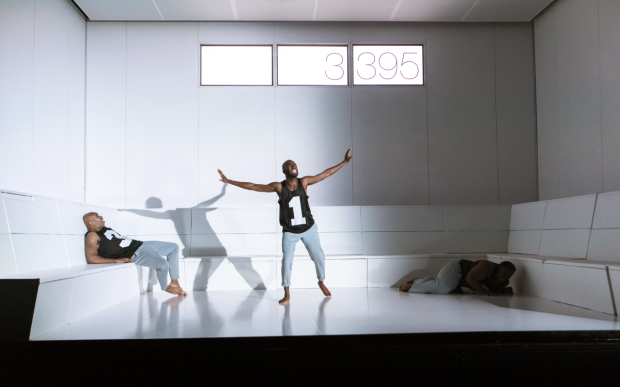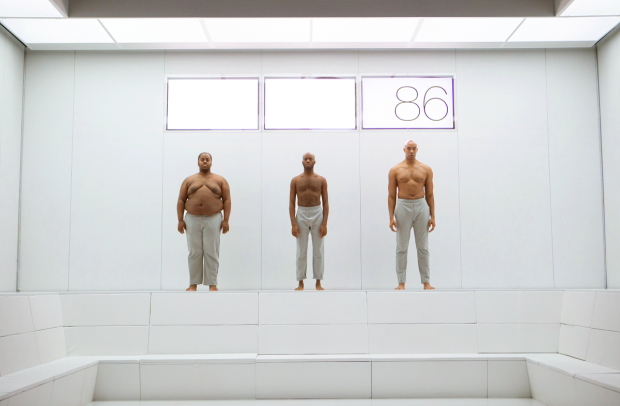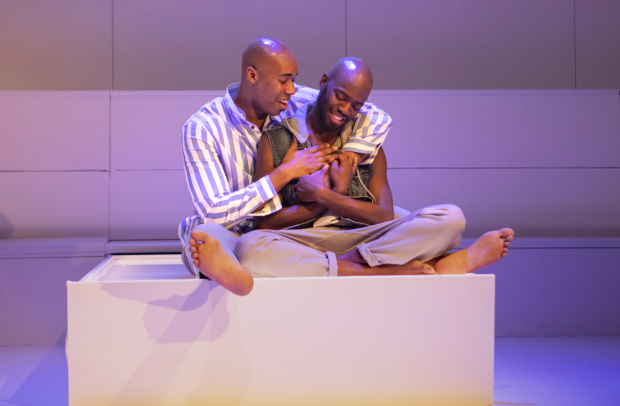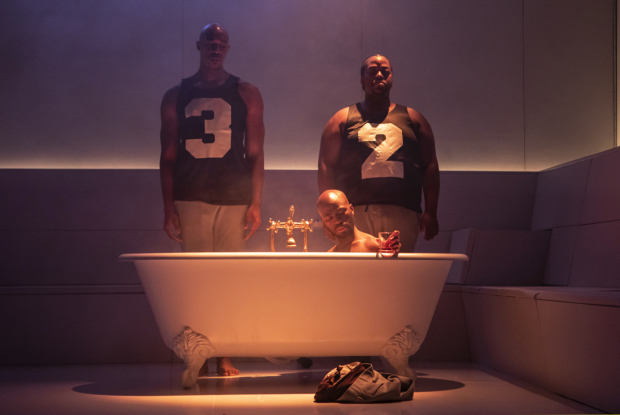One in Two Looks at the Absurdity of Being a Black, Queer, HIV-Positive Man
Donja R. Love’s semiautobiographical play makes its world premiere.

(© Monique Carboni)
In a program note, Donja R. Love writes that the title of his new play comes from a report released by the Center for Disease Control and Prevention that states "one in two Black gay and bisexual men will be diagnosed with HIV in their lifetime." The statistic is beyond alarming, and it raises questions about why the rate of infection among black men who have sex with men is so much higher than that of Latinos and whites.
The absurdity of the statistic is not lost on Love, who is black and has been positive for about 10 years, and he gives those numbers an absurdist tweak in his moving, funny, at times heavy-handed play One in Two, now making its world premiere in a New Group production at the Pershing Square Signature Center. In our age of PrEP and antiretroviral therapy, HIV can sometimes seem like a public-health crisis that no longer requires the vigilance that it once did. But the virus is still very much with us, and the plight of black men with HIV can quickly become invisible when the number of newly infected white men falls. In One in Two, Love grabs us by the collar and shows us that the crisis is still critical.

(© Monique Carboni)
Because an absurd statistic deserves absurd treatment, Love departs from the more realistic style of his previous works Sugar in Our Wounds and Fireflies and does something more experimental here. Before entering the theater, we're instructed to take a ticket from a ticket dispenser. Each slip of paper has a 1, 2, or 3 on it. Onstage, three shirtless black men wearing gray hospital pants (costumes by Andy Jean) sit in a clinically white, brightly lit "waiting room" that also functions as the site of a lab experiment (Arnulfo Maldonado designed the shape-shifting set and Cha See the lighting).
These nameless men — identified by the numbers 1, 2, and 3 — must take turns reenacting over and over again the life of a queer black man who will contract HIV (the audience is asked to applaud for the actor they'd like to play #1 — Leland Fowler at the performance I attended). An unseen force inflicts pain on the men if they refuse to carry out the Sisyphean task.
So carry it out they do. This time around though they're being watched by an audience. To help us follow the "amorphous, challenging, and borderline non-existent ass plot," as #3 calls it, #1 decides to call himself Donté. Then he takes us through his childhood, his traumatic visit to the HIV clinic, his conflicted relationship with his mother, his descent into alcohol abuse and anonymous sex, his depression and suicidal thoughts, and his eventual decision to get his life down on paper and into a play. All the while, three screens above the stage display a continuously growing number that indicates the men who, like Donté, live this same story day after day while we, the audience, watch and do nothing.

(© Monique Carboni)
Though its setting is alienating, Love packs heartfelt intimacy into this 80-minute play, and director Stevie Walker-Webb makes some scenes resonate with authentic emotion. At my performance #2 was played by Edward Mawere, who makes a stunning off-Broadway debut in multiple roles and stood out for his portrayal of Donté's overbearing mother and the hilarious "Banji Cunt at the Center." Jamyl Dobson (#3) showed his versatility as Donté's nurse and "Kinda Ex-Boyfriend," and Fowler (#1) gave a powerful, heartrending portrayal of Donté in the play's single most emotionally challenging role.
In many ways the Godot-like waiting room, the ticker with its ever-increasing number, and the trapped men's fruitless revolts against unseen oppressive forces are all spot-on metaphors for the plight of black gay and bisexual men. But despite the actors' exhaustingly strong performances, the absurdist bells, whistles, and ticket dispensers (it was not made clear to me why we took numbers on the way in) sometimes seem at odds with the poignant storytelling.

(© Monique Carboni)
One of the show's toughest and most honest moments comes in a quiet scene in which #2 tells the story of his status and admits how the expressions that he sees on the faces of people he tells about his condition torment him more than anything else. Here and elsewhere, we feel we're witnessing a different play, one that could perhaps have been told more effectively outside this existential waiting room. The story, in short, does not always match the medium.
Still, there is much to admire about Love's latest work. Higher-profile plays about men living with HIV and AIDS have run in New York in the past year, including Angels in America and, currently, The Inheritance. Both of those involve mostly white characters who live far less economically challenged lives than the men we meet in Love's play. One in Two gives visibility to men whom America often chooses to keep invisible, or at most relegate to a statistical chart. #2's cry for help at the end is real, and Love shows us that until the help arrives, America's Dontés wait and wait.








